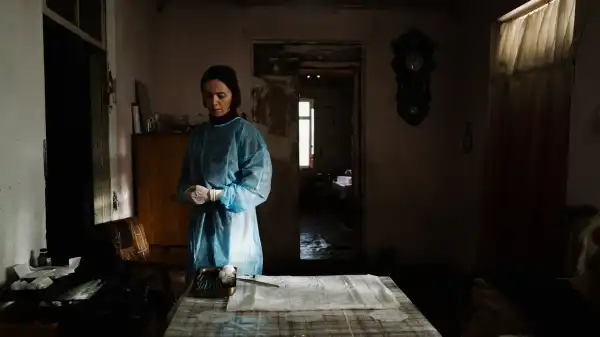
Save this storySave this storySave this storySave this story
Before watching April, the latest film by Georgian director and screenwriter Dea Kulumbegashvili, I had seen only one other feature film that depicted an actual birth: Remaining Vertical (2016), by French director Alain Guiraudie, which, despite its absurdity, captured the birth in one continuous shot, giving credence to its authenticity. I had also seen several films with graphic but clearly staged abortion scenes, including Audrey Diwan’s The Happening (2022), a French film, and Myroslav Slaboshpytsky’s The Tribe (2015). I admit my research was not exhaustive, but the cinema of overt obstetrics has always seemed to be a predominantly European art-house phenomenon. Fair or not, I can’t think of a single American film—not even Never Rarely Sometimes Always, Eliza Hittman’s meticulous 2020 abortion drama—that has subjected both the beginning and end of pregnancy to such stark and disturbing scrutiny.
Even among this writhing, confrontational group, April stands out. Set in a dank corner of eastern Georgia, this intensely dark and devastating work shows us a simulated abortion, as well as two unsimulated births—one vaginal, one Caesarean—and, for added realism, the administration of an epidural. Each of these scenes is shot in a single, static frame, constructed by cinematographer Arseni Khachaturan in a nearly square format that does not turn away until the procedure is complete. You are reminded that the key to realism is not always a convincing prosthesis or a sudden surge of blood; it is the weight of time itself. By giving these medical interventions the proper duration and respect, Kulumbegashvili imbues them with an element of the sacred. This even applies to the abortion scene: a petrified young woman, raped by a relative, undergoes the abortion procedure at her family’s dinner table. (In the Republic of Georgia, abortion is legal up to twelve weeks of pregnancy, but this may not be the case: the Georgian Orthodox Church's strong condemnation of abortion dominates public opinion.) The scene is horrific, but thanks to the camera's unwavering focus and the doctor's calm, reassuring action, it turns into a grotesque vision of grace.
The doctor is Nina (Ia Sukhitashvili), a highly trained and dedicated obstetrician-gynecologist in her forties, with considerable experience in overseeing complicated pregnancies and difficult births. The film’s plot, set over several cold weeks in April 2023, is driven by a rare tragic event: Nina gives birth to a child who is soon declared dead. The father (Sandro Kalandadze), overcome with grief and anger, accuses her of deliberately killing the child, caused by a monstrous mixture; rumors of Nina’s abortions in the village spread. A close colleague, doctor David (Kakha Kintsurashvili), hearing about the abortions, warns Nina to stop them for the sake of her career: “No one will thank you, and no one will protect you.”
As it turns out, David has been asked to lead an investigation into a stillbirth at the hospital, even though Nina has already calmly and correctly identified the cause: the pregnancy was not disclosed, and so the mother (Tosia Dolojani) did not receive antenatal care, meaning that any potential distress signals were detected too late, during labor. The film suggests that unreported pregnancies are not uncommon in this region, where young women are pressured to marry and have children early. Contraception is hardly less frowned upon than abortion. In one memorable scene, Nina encounters a teenage newlywed who is afraid to admit that she is not ready for motherhood; Nina hands her a pack of birth control pills, warning her not to tell anyone. Both women’s voices are barely above a whisper, and yet we catch their every word and the air of conspiratorial intimacy that the camera creates. This silent observation feels like a promise, as if the film itself is stamped with a confessional stamp.
Kulumbegashvili made her feature film debut with the aptly titled Beginning (2020), a drama set in a remote Jehovah’s Witness community that is being brutally attacked by extremists in the surrounding Orthodox majority. Sukhitashvili also starred in the film; she played Yana, a preacher’s wife who gradually becomes aware of—and begins to resist—the religious and patriarchal prison built around her and the other women in her circle. It would be hard to imagine two films more carefully designed to work as companion pieces than Beginning and April, both of which draw on the same deliberate, contemplative stylistic approach and are built on extreme contrasts of human experience. Each intertwines brutality with tenderness, with heinous action set against a backdrop of often dreadful
Sourse: newyorker.com






